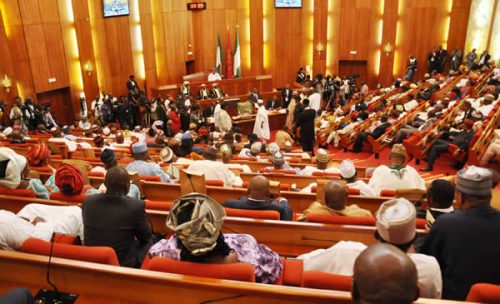A Nigerian lawmaker is proposing a new currency law that would give the central bank legal powers to set exchange rates, effectively rolling back the nation’s six-month-old free float.
The bill, sponsored by opposition politician John Enoh, would repeal existing foreign-exchange legislation, under which market rates are “mutually agreed” between counterparties, and allow the Abuja-based regulator to decide those rates itself. The draft has been through two readings in the Senate and will be put to a public hearing next year, according to Enoh, a senator representing the south-eastern state of Cross River with the main opposition People’s Democratic Party.
“The Bank may determine the basic exchange rate, rate of purchase and sale of foreign exchange and arbitrated exchange rate in foreign exchange transactions, if it is necessary to do so for harmonious and orderly foreign exchange transactions in Nigeria,” according to a copy of the proposed law. “Residents and non-residents shall perform transactions in conformity with such basic exchange rate.”
If passed, the legislation would give the central bank more freedom to defend the naira, which has tumbled 37 percent to around 315 per dollar since Governor Godwin Emefiele abandoned the peg in June. Analysts say the central bank is still intervening to stop it weakening, with foreign-currency reserves dropping to an 11-year low in October. The black-market exchange rate has collapsed to a record 485 as dollar shortages in Africa’s most populous country mount.
The proposed law is separate from a draft amendment to existing legislation published last month by the Nigerian Law Reform Commission, an independent body. It proposed jailing people who hold dollars in cash for more than 30 days and restricting capital outflows. The central bank denied it was behind that document.
The naira fell 0.3 percent to 316.25 per dollar by 9:46 a.m. in Lagos, the main commercial hub. One-year, non-deliverable forward contracts trade at 435, a sign investors see more weakening to come.
